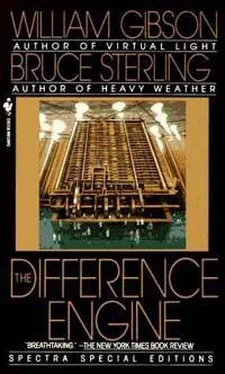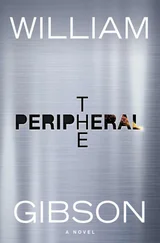William Gibson - The Difference Engine
Здесь есть возможность читать онлайн «William Gibson - The Difference Engine» весь текст электронной книги совершенно бесплатно (целиком полную версию без сокращений). В некоторых случаях можно слушать аудио, скачать через торрент в формате fb2 и присутствует краткое содержание. Жанр: sf_cyber_punk, fantasy_alt_hist, на английском языке. Описание произведения, (предисловие) а так же отзывы посетителей доступны на портале библиотеки ЛибКат.
- Название:The Difference Engine
- Автор:
- Жанр:
- Год:неизвестен
- ISBN:нет данных
- Рейтинг книги:3 / 5. Голосов: 1
-
Избранное:Добавить в избранное
- Отзывы:
-
Ваша оценка:
- 60
- 1
- 2
- 3
- 4
- 5
The Difference Engine: краткое содержание, описание и аннотация
Предлагаем к чтению аннотацию, описание, краткое содержание или предисловие (зависит от того, что написал сам автор книги «The Difference Engine»). Если вы не нашли необходимую информацию о книге — напишите в комментариях, мы постараемся отыскать её.
The Difference Engine — читать онлайн бесплатно полную книгу (весь текст) целиком
Ниже представлен текст книги, разбитый по страницам. Система сохранения места последней прочитанной страницы, позволяет с удобством читать онлайн бесплатно книгу «The Difference Engine», без необходимости каждый раз заново искать на чём Вы остановились. Поставьте закладку, и сможете в любой момент перейти на страницу, на которой закончили чтение.
Интервал:
Закладка:
He looked up at Betteredge, then down at the file, seeing Radley's blood spread in a tacky pool.
"We're in Horseferry Road, sir."
The cab came to a halt.
"Yes, thank you." He closed the file and handed it to Betteredge. He descended from the cab and mounted the broad stairs.
Regardless of the circumstances surrounding a given visit, he invariably felt a peculiar quickening upon entering the Central Statistics Bureau. He felt it now, certainly: a sense of being observed, somehow—of being known and numbered. The Eye, yes…
As he spoke to the uniformed clerk at the visitor's-desk, a gang of journeymen mechanics emerged from a hallway to his left. They wore Engine-cut woolen jackets and polished brogues soled with creped rubber. Each man earned a spotless tool-satchel of thick white duck, cornered with bronze rivets and brown hide. As they moved toward him, conversing among themselves, some drew pipes and cheroots from their pockets in anticipation of a shift's-end smoke.
Oliphant experienced a sharp pang of tobacco-hunger. He had often had call to regret the Bureau's necessary policy regarding tobacco. He looked after the mechanics as they passed, out between the columns and the bronze sphinxes. Married men, assured of a Bureau pension, they would live in Camden Town, in New Cross, in any respectable suburb, and would furnish their tiny sitting-rooms with papier-mache side-boards and ornate Dutch clocks. Their wives would serve tea on gaudily japanned tin trays.
Passing an irritatingly banal quasi-biblical bas-relief, he made his way to the lift. As the attendant bowed him in, he was joined by a glum gentleman who was daubing with a handkerchief at a pale streak on the shoulder of his coat.
The articulated bars of the brass cage rattled shut. The lift ascended. The gentleman with the soiled coat made his exit at the third stop. Oliphant rode on to the fifth, the home of Quantitative Criminology and Non-Linear Analysis. While he found the latter infinitely more compelling than the former, it was Q C he needed today, most particularly in the person of Andrew Wakefield, the departmental Under-Secretary.
The clerks of Q C were individually walled into neatly cramped cells of rolled-steel, asbestos, and veneer. Wakefield presided over them from a grander version of the same scheme, his sparse sandy head framed by the brass-fitted drawers of a multitude of card-files.
He glanced up as Oliphant approached, prominent front teeth displayed against his lower lip. "Mr. Oliphant, sir," he said. "A pleasure as ever. Pardon me." He shuffled a number of punch-cards into a sturdy blue envelope lined with tissue-paper, and meticulously wound the little scarlet string about the two halves of the patent-clasp. He set the envelope aside, in an asbestos-lined hutch containing several other envelopes of identical hue.
Oliphant smiled. "Fancy I can read your punch-holes, Andrew?" He levered a spring-loaded stenographer's-chair up from its ingenious housing and took a seat, his furled umbrella balanced across his knees.
"Know what a blue envelope's about, do you?" Springs clanged as Wakefield folded his articulated writing-desk into its narrow slot.
"Not a specific one, no, but I rather imagine that's the trick of it."
"There are men who can read cards, Oliphant. But even a junior clerk can read the directive primaries as easily as you read the kinos in the underground."
"I never read the kinos in the underground, Andrew."
Wakefield snorted. Oliphant knew this to be his equivalent of laughter. "And how are things among the corps diplomatique, Mr. Oliphant? Coping with our 'Luddite conspiracy,' are we?" It would have been impossible to mistake the man's sarcasm, but Oliphant pretended to take him quite literally.
"It really hasn't had too great an effect, as yet. Not among my own areas of special interest."
Wakefield nodded, assuming that Oliphant's "areas of special interest" were limited to the activities of foreign nationals on British soil. On Oliphant's request, Wakefield regularly ordered the files spun on groups as diverse as the Carbonari, the Knights of the White Camellia, the Fenian Society, the Texas Rangers, the Greek Hetairai, the Pinkerton Detective Agency, and the Confederate Bureau of Scientific Research, all of whom were known to be operative in Britain.
"I trust that the Texian material we provided has been of some use?" Wakefield inquired, coil-springs creaking behind him as he leaned forward.
"Quite," Oliphant assured him.
"You wouldn't know," Wakefield began, taking a gold-plated propelling-pencil from his pocket, "if their legation intends a change of premises?" He tapped the pencil against his front teeth, producing a loud clicking sound that Oliphant found repulsive.
"From their present location in St. James's? 'Round from Berry's the wine-merchant?"
"Precisely."
Oliphant hesitated, seeming to weigh the matter. "I shouldn't think so. They haven't any money. I suppose it would depend upon the good-will of the landlord, finally… "
Wakefield smiled, his teeth dimpling his lower-lip.
"Wakefield," Oliphant said, "do tell me—who wishes to know?"
"Criminal Anthropometry."
"Really? Are they involved in surveillant activities?"
"I gather it's technical, actually. Experimental." Wakefield put his pencil away. "Your savant chap—Mallory, was it?"
"Yes?"
"Saw a review of his book. Off to China, is he?"
"Mongolia. Heading up an expedition for the Geographical Society."
Wakefield pursed his lips and nodded. "Out from underfoot, I should think."
"Out of harm's way, one should hope. Not a bad sort, really. Seemed to keenly appreciate the technical aspects of your Bureau's work. But I've a technical matter for you myself, Andrew."
"Really?" Wakefield's springs creaked.
"Having to do with Post Office procedure."
Wakefield made a small, entirely noncommittal sound in his throat.
Oliphant took an envelope from his pocket and passed it to the Under-Secretary. It was unsealed. Wakefield took a pair of white cotton gloves from a wire basket at his elbow, drew them on, extracted a white telegraphic address-card from the envelope, glanced at it, then met Oliphant's gaze.
"Grand's Hotel," Wakefield said.
"Quite." The establishment's crest was printed on the card. Oliphant watched as Wakefield automatically ran a gloved fingertip across the lines of punch-holes, checking for indications of wear that might cause mechanical difficulties.
"You wish to know who sent it?"
"That information is in my possession, thank you."
"Name of addressee?"
"I am aware of that as well."
The springs creaked—nervously, it seemed to Oliphant. Wakefield rose, with a twanging of steel, and carefully inserted the card in a brass slot set into the face of a glass-fronted instrument which overhung a bank of card-files. With a glance at Oliphant, he reached up a gloved hand and cranked down an ebony-handled lever. On the down-stroke, the device thumped like a shopman's credit-press. As Wakefield released the lever, it began to slowly right itself, humming and clicking like a publican's wagering-machine. Wakefield watched as the whirling character-wheels ticked and slowed. Abruptly, the device was silent.
"Egremont," Wakefield read aloud, but quietly, " 'The Beeches,' Belgravia."
"Indeed." Oliphant watched as Wakefield extracted the card from the brass slot. "I require the text of that telegram, Andrew."
"Egremont," Wakefield said, as though he hadn't heard. He took his seat again, replaced the card in its envelope, and removed his gloves. "He seems to be everywhere, our Right Honorable Charles Egremont. No end of work he's making for us here, Oliphant."
"The text of the message, Andrew, is here in the Bureau. It exists physically, I believe, as however many inches of telegrapher's tape."
Читать дальшеИнтервал:
Закладка:
Похожие книги на «The Difference Engine»
Представляем Вашему вниманию похожие книги на «The Difference Engine» списком для выбора. Мы отобрали схожую по названию и смыслу литературу в надежде предоставить читателям больше вариантов отыскать новые, интересные, ещё непрочитанные произведения.
Обсуждение, отзывы о книге «The Difference Engine» и просто собственные мнения читателей. Оставьте ваши комментарии, напишите, что Вы думаете о произведении, его смысле или главных героях. Укажите что конкретно понравилось, а что нет, и почему Вы так считаете.









